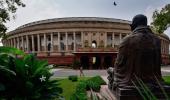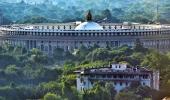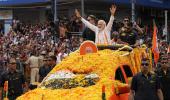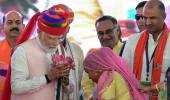This form of government, where secrets and major decisions are kept from the Cabinet itself, appears to be continuing, which is why the speculation around this special session, asserts Aakar Patel.

A report was published on Saturday September 9 with the headline 'Joint sitting of both Houses to bid farewell to old Parliament building?'
The question mark is normal, because few know what the agenda of the special session is.
The report reads: 'Just ahead of the five-day special session, there is considerable speculation over whether a joint meeting of the two Houses will be convened on September 19 in the iconic Central Hall to say goodbye to the existing Parliament building.'
Why would one need five days to say goodbye to a building?
And why is there the need for 'considerable speculation' in a democracy when laws and changes should be discussed openly and transparently? This, the report did not enlighten readers on.
When this special session was first announced on August 31, there began a guessing game on why it was being called so shortly after one session had just ended on 11 August.
The Winter session will begin in November so it is not as if there is no other time for parliament to meet. Why again this month?
Some said it was to change the name of India to Bharat. Two days of media focus went into that.
Ministers defended the move saying there was nothing wrong with it, but were unable to confirm whether or not this change in the nation's name was what the session was for.
Another guess was that it had to do with the passing of the Women's Reservation Bill.
This was originally passed by the Rajya Sabha in 2008, but then it stalled because of a lack of support and demands of sub-reservation within this category for marginalised sections.
If this is on the agenda and it goes through it will set aside one third of all seats in the Lok Sabha and state assemblies for women.
This is a considerable reform and if it is indeed this law that is being taken up, one hopes it passes. But of course one doesn't know.
Another guess in the media was that the government, for whatever reason, was calling elections early.
They are due in May next year, meaning in another eight months, but they might be advanced just as the Vajpayee government had done in 2004.
This theory has not found many takers, but again who knows.
Vajpayee's gambit to call polls early did not succeed and the government fell, so there will likely be caution on this front.
The most fervent speculation was around something called one nation one election, a system whereby all states and the Union will go into election every five years together and citizens will vote for assembly and Lok Sabha at the same time.
Will corporation elections also be included? One doesn't know.
What about by-elections? And how will the EVMs be set up for multiple elections?
One does not know that either but perhaps wiser minds have already sorted such things out.
A committee has been set up under a former President to look into the idea, but how this committee will meet and give its findings all in time for the special session is unclear.
One more story floated in the media was that the session was about a commission set up in 2017 to look at sub-categorisation of OBCs so that reservations could be made more equitable.
The parliamentary form of government carries with it something called collective responsibility, meaning that decisions are jointly owned.
But here the Cabinet is as much in the dark about decisions as the rest of us are.
Two instances from the past will suffice to demonstrate this.
The first was a report from November 10, 2016, headlined 'Don't bring your phones': Modi's Cabinet meet that took everyone by surprise'.
The report said that Union ministers found out about Demonetisation the same day as the rest of us, meaning that it was neither discussed nor debated.
Another instance is the BBC's filing of more than 240 Right to Information queries with the government about the national lockdown of 2020.
They asked the Union government departments of health, finance, disaster management and the rest about what they knew regarding the lockdown and how they prepared.
The answer was that they did not know and did not prepare.
This form of government, where secrets and major decisions are kept from the Cabinet itself, appears to be continuing, which is why the speculation around this special session.
There is to be no Question Hour either in this session, and while this is expected it is not necessary.
Even questions asked are not answered in the Lok Sabha so what is the point of stopping them from being asked?
The Opposition has sent a list of things they would like discussed in the session.
These include inflation, joblessness, MSP for farmers, the continuing violence in Manipur, the Adani scandal, communal tensions across India, Chinese actions in Ladakh and elsewhere, the need for a caste census (or any census, given that the primary one has been inexplicably delayed), the strains on federalism and impact of natural disasters and climate change.
It is unlikely that, assuming these are not already on the agenda, they will be taken up by the government.
When even the Cabinet itself has such little say in what should be discussed and passed, why should the Opposition be listened to?
Aakar Patel is a columnist and writer and you can read Aakar's earlier columns here.
Feature Presentation: Aslam Hunani/Rediff.com











 © 2025
© 2025